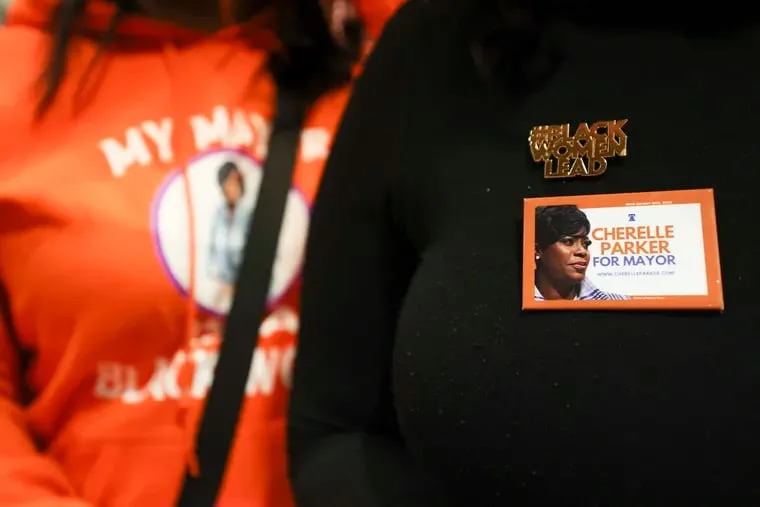
With the election of Cherelle Parker, Philadelphia has joined major cities such as Atlanta, Baltimore, Chicago, and Los Angeles that have elected Black women mayors in communities with deeply tarnished racial histories — a milestone that transcends voters’ selection of the city’s first female and fourth African American chief executive.
It is a moment that also illustrates how Black women mayors, especially those in the nation’s largest cities, continue to break down barriers that once restricted them to supporting roles in local politics — as poll workers, community organizers, and election officials — but not candidates.
One of us, Sharon Wright Austin, has studied African-American politics for three decades and has conducted research that provides a window into the distinctive challenges faced by Black female mayors.
Sharon’s research has shown that African-American women mayors experience persistent bias based on their race and gender, are often held to a higher standard than their white counterparts, and find themselves criticized for demonstrating qualities (such as assertiveness) that are often praised in men.
The elections of Black women chief executives at the local level are hardly new occurrences. In the late 1960s and early 1970s — the years immediately following the modern civil rights movements — African American men usually ran for office while Black women worked behind the scenes mobilizing voters. (Cleveland’s Carl Stokes was able to be elected as the first Black mayor of a major American city in 1967 largely because of the vital role of Black female organizers.)
According to researchers at the Center for American Women and Politics at Rutgers University, Ellen Walker Craig-Jones of Urbancrest, Ohio was the first Black woman elected by a popular vote to lead an American municipality in 1971.
With the election of Parker, eight of the nation’s 100 largest cities — including Los Angeles, Charlotte, N.C., San Francisco, Washington, D.C., St. Louis, and New Orleans — have Black women mayors; in addition to Parker’s victory Tuesday, Vi Lyles — the first Black woman mayor of Charlotte, N.C. — cruised to a fourth term. (Elaine O’Neal, an African American woman who had served as the mayor of Durham, N.C., chose not to seek reelection.)
Sharon’s research finds that most of the current Black female mayors have a few traits in common: a majority were campus and community activists, had joined historically Black sororities, worked in government service, and began their political careers either on city councils or in state legislatures.
Cherelle Parker has a political background that is similar to that of other Black female mayors because of her history of community service and the elected positions that she’s held on City Council and in the Pennsylvania General Assembly. She also joins other Black female mayors who were recently elected in Pennsylvania cities and boroughs, including Harrisburg and York.
» READ MORE: Ninety-nine mayors — and finally one who looks like me | Jenice Armstrong
Like other large urban municipalities, race is an ever-present issue in Philadelphia politics. Sharon’s research has shown that — perhaps to offset any potential bias by voters — some Black male and female mayors have tried to govern in a “deracialized” style by downplaying the racial component of political issues. However, it would be virtually impossible for Parker to ignore the role of race in a city where African Americans make up roughly 43% of the population.
The complexities associated with race and gender are usually a type of elephant-in-the-room barrier for Black women politicians. While racial polarization undoubtedly remains a significant problem in many American cities, women like Marilyn Strickland and Victoria Woodards of Tacoma, Washington and London Breed of San Francisco won elections in cities with relatively small Black populations.
Sharon’s research also finds that white males vote for Black women in larger percentages than white females, and that Black female candidates typically win elections with a more diverse coalition of voters than Black male candidates.
There is also evidence that Black women mayors are held to higher standards than their white counterparts while in office. They are often blamed for problems that have existed in cities decades before their terms began. For example, one possible explanation for the failed reelection bid of Chicago’s Lori Lightfoot stemmed from rampant crime in the city.
Yet, crime has long been a problem in Chicago. In one of her final interviews as mayor, Lightfoot acknowledged that her race and gender may have played a role in voters’ opinions of her leadership when she noted, “I’m always going to be viewed through a different lens — that the things I do and say, that the toughness that I exhibit, is viewed as divisive; that I’m the mean mayor; that I can’t collaborate with anyone.”
Sharon’s research finds that all of the Black women in the study who lost reelection campaigns, were defeated by men with “law and order” platforms. Those outcomes reinforce persistent questions about the role of gender in voter perceptions of political candidates, particularly whether some voters are more likely to believe that women, regardless of their race, are weak on crime and that, as a result, men should be chosen to lead cities.
Time will tell whether those perceptions might also affect Parker, who has chosen to make fighting crime by hiring more police officers and taking other measures a key platform of her election campaign.
One of the nation’s first elected Black female mayors, Lelia Foley-Davis of Taft, Oklahoma, said that she ran for mayor in 1973 because “I believed in God, and I believed in myself. I saw the need in the community for leadership, so I decided to pitch my hat.”
In the half century since, many African American women like Cherelle Parker have pitched in their hats for mayor and won — despite the barriers against them.
Sharon D. Wright Austin, a professor of political science at the University of Florida, is the editor of Political Black Girl Magic: The Elections and Governance of Black Female Mayors, which was published earlier this year by Temple University Press. N’Jhari Jackson, a former student-athlete, is a master’s degree candidate in sport management at Florida.


